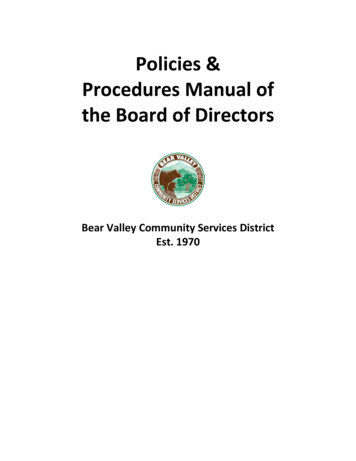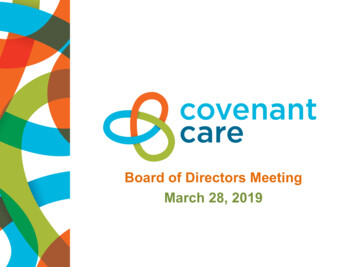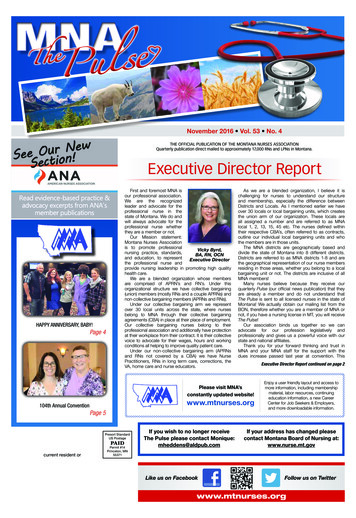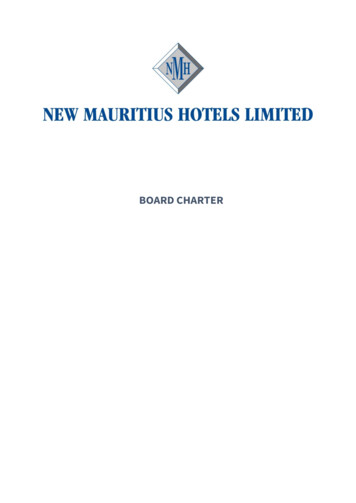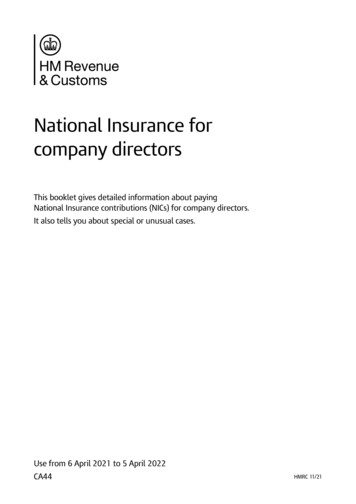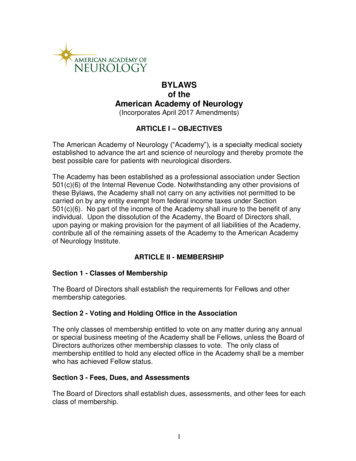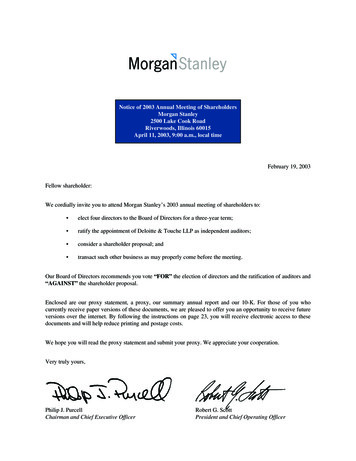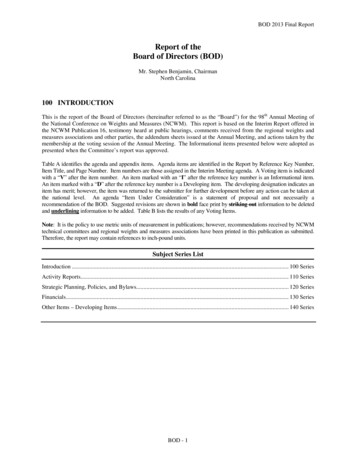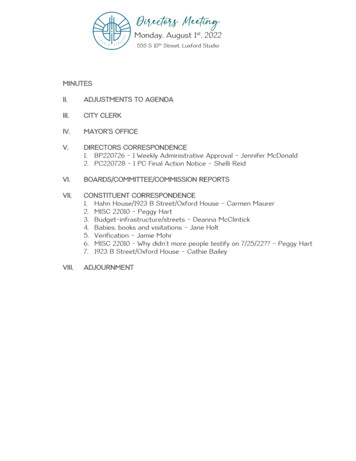
Transcription
Directors MeetingMonday, August 1st, 2022555 S 10th Street, Luxford StudioMINUTESII.ADJUSTMENTS TO AGENDAIII.CITY CLERKIV.MAYOR’S OFFICEV.DIRECTORS CORRESPONDENCE1. BP220726 - 1 Weekly Administrative Approval – Jennifer McDonald2. PC220728 - 1 PC Final Action Notice – Shelli ReidVI.BOARDS/COMMITTEE/COMMISSION REPORTSVII.CONSTITUENT CORRESPONDENCE1. Hahn House/1923 B Street/Oxford House – Carmen Maurer2. MISC 22010 – Peggy Hart3. Budget-infrastructure/streets – Deanna McClintick4. Babies, books and visitations – Jane Holt5. Verification – Jamie Mohr6. MISC 22010 - Why didn't more people testify on 7/25/22? – Peggy Hart7. 1923 B Street/Oxford House – Cathie BaileyVIII.ADJOURNMENT
MemorandumDate:July 26, 2022To:City ClerkFrom:Alexis Longstreet, Planning Dept.Re:Administrative Approvalscc:Shelli Reid, Planning Dept.This is a list of City administrative approvals by the Planning Director from July 19, 2022,through July 25, 2022:Administrative Approval 22048 to Special Permit #18021 Hillcrest Community Unit Planwas approved on July 19, 2022, to revise one of the rear yard setbacks for Lot 4, Block 10on property generally located at 1180 East Hillcrest Drive.City/County Planning Department555 S. 10th Street, Ste. 213 Lincoln NE 68508(402) 441-7491
PLANNING COMMISSION FINAL ACTIONNOTIFICATIONTO:Mayor Leirion Gaylor BairdLincoln City CouncilFROM:Shelli Reid, PlanningDATE:July 28, 2022RE:Notice of final action by Planning Commission: July 27, 2022Please be advised that on July 27, 2022, the Lincoln City-Lancaster County PlanningCommission adopted the following resolutions:Resolution PC-01816, approving SPECIAL PERMIT 19032A, to renew or extend an existingsoil excavation Special Permit for three more years, generally located at North 112th andHavelock Ave.Resolution PC-01817, approving SPECIAL PERMIT 22020, to allow for an AGR (AgriculturalResidential District) CUP (Community Unit Plan), for seven single family lots, generally locatedat 7433 SW 27th Street.The Planning Commission action on these applications is final, unless appealed to the CityCouncil by filing a notice of appeal with the Planning Department within 14 days of the actionby the Planning CommissionThe Planning Commission Resolution may be accessed on the internet at www.lincoln.ne.gov(search for "PATS"). Click on "Planning Application Tracking Service (PATS)" at the top of thepage, click "Selection Screen" under "PATS Tools" on the right side of the screen, type in theapplication number (i.e. SP19032A, SP22020), click on "Search", then "Select", and go to"Related Documents".F:\devreview\final action notices\cc\2022\072722
From:To:Subject:Date:Attachments:Carmen MaurerCouncil Packet; MayorHahn House/1923 B Street/Oxford HouseThursday, July 21, 2022 11:41:38 AMOxford House, Inc. v. City of Wilmington[39].pdfDear Mayor Gaylor-Baird and Members of the City Council:Please accept this e-mail and the attachment in relation to the Council’s meeting of July 25, 2022,and the agenda item related to 1923 B St.Attached is a case from the Eastern District of North Carolina, which does an excellent job ofdiscussing the history of Oxford House, as well as how this matter should be addressed. I believeyou have a letter from Oxford House’s legal counsel, essentially a legal brief, arguing Oxford House’sposition. It’s important to recognize that the matter is not so clear as Oxford House’s briefadvocates. While reading caselaw may not be loads of fun, I think you’ll find this case interesting, asyou could virtually replace the City of Wilmington with the City of Lincoln and be presented with thematter we address at 1923 B. I urge you to review the attached.In reading this case, you would learn from Judge James Fox:Oxford House’s method of acting first, and then fighting compliance with the law, bydemanding the law bend to its actions is well-established. This is its approach acrossthe entire US. Oxford House essentially conducts itself, as if it is above the laws withwhich the rest of us abide.It is Oxford House’s obligation and burden to show and prove that the requestedaccommodation is backed by legitimate evidence. I have asked, but not received ananswer, with respect to how the City of Lincoln’s process incorporates evidence into itsdisability evaluation. The City, before granting the request must ask: why is 14 theright number of residents in a house, not 6 or 8 or 35? According to Judge Fox, simplyaccepting Oxford House’s unsupported request for reasonable accommodation is nothow the Fair Housing Act is implemented. If one is going to ask that the law be bent totheir favor, then the requester must show with solid evidence and logic (not broadbased statements and opinions), that such bending of the law is reasonable.Reasonable accommodation is not something broadly applied to large groups; it isstrategically designed for the needs of a specific disabled individual.Of great importance, reasonable accommodation is not a function of maximized rentalrevenue for the property owner. Reduced rent for individual tenants (as a result ofmore tenants in one facility) is not an element to be considered when grantingdisability accommodation. Every renter, regardless of circumstances, benefits fromcheaper rent if we’d pack more persons into a property.And finally, and maybe most importantly, the Fair Housing Act does not require localgovernment to abandon its legitimate interest in strategic land use planning.Accommodation may be appropriate; it may be granted, but there is no requirementfor a city to ignore reasonableness.
I respectfully request that you read and consider the wisdom of Judge Fox.Thank you, Carmen MaurerP.S. I note that a recent request, where Oxford House is now required to comply with Wilmington,NC, ordinances prior to facility occupation, resulted in an approval of 8 tenants over Oxford’srequest for 10. These requests to waive zoning laws are not a fait complete.
No: 7:07-CV-61-FUnited States District Court, E.D. North Carolina, Southern DivisionOxford House, Inc. v. City of WilmingtonDecided Oct 28, 2010No: 7:07-CV-61-F.October 28, 2010ORDERJAMES FOX, Senior District Judge2judgment, the City filed a Withdrawal of Requestfor Jury Trial [DE-29], and indicates thewithdrawal is with Oxford House's consent.1 The Fair Housing Amendments Act of1988 ("FHAA"), P.L. 100-430,102 Stat.1619, amended the Fair Housing Act of1968 to extend its coverage to housingThis matter is before the court on Plaintiffs'Motion for Partial Summary Judgment [DE-22]and Defendant's Motion for Summary Judgment[DE-20]. The parties also have filed a joint Motionto Continue [DE-76] the trial and pretrialproceedings. The motions have been fully briefedand are ripe for disposition.discrimination on the basis of handicap andPlaintiffs, Oxford House, Inc. and Harold Laing(collectively, "Oxford House"), brought this actionagainst the Defendant, City of Wilmington, NorthCarolina ("the City"), to enforce the provisions ofthe Fair Housing Act, as amended, 42 U.S.C. §3601, et seq. ("FHA")1, the Americans withaccommodations to afford a handicappedDisabilities Act, 42 U.S.C. § 12131, et seq.("ADA"), and the Rehabilitation Act of 1973, 29U.S.C. § 794, et seq. Oxford House alleges thatthe City violated the FHA by failing to grantOxford House a "reasonable accommodation"when the City denied Oxford House's request for azoning ordinance text amendment to permitOxford House to operate two "large" group homesfor recovering alcoholics and drug addicts incertain single-family residential districts wheresuch homes are prohibited. In the Complaint [DE1], Oxford House seeks *2 injunctive relief,compensatory damages and attorney's fees. TheCity filed an Answer [DE-8], and demanded a trialby jury. After filing its motion for summaryfamilial status. The core of the amendedstatute's provisions relating to housingdiscrimination on the basis of handicapappear in § 804(f), codified at 42 U.S.C.A.§ 3604(f), which includes a subsection, 42U.S.C.A. § 3604(f)(3)(B), making itunlawful to refuse to make reasonableperson equal opportunity to use and enjoy adwelling. For ease of reference, "FHA" asused herein encompasses the FHA and theapplicable amendments.The parties have filed cross-motions for summaryjudgment on the sole issue whether the Cityviolated the FHA by refusing to grant OxfordHouse's "reasonable accommodation" request. Insupport of their respective motions, the partiesseparately have filed a Joint Record [DE-21, DE23], a copy of which is attached to the parties'respective motions for summary judgment. Theparties stipulate that the exhibits contained in thejoint record constitute the complete evidentiarybasis for this action. See [DE-21], Ex. 2 (JointRecord of the Parties). The parties do not disputethe authenticity of the documents comprising theJoint Record. Accordingly, for ease of reference,1
Oxford House, Inc. v. City of WilmingtonNo: 7:07-CV-61-F (E.D.N.C. Oct. 28, 2010)all factual citations herein are to Exhibitsconstituting the Joint Record appended to theOxford House Memorandum at [DE-23].an attempt to ensure that recovering individualshave the best opportunity to live a clean and soberlife. Ex. C, Part 2, at pp. 6-9.2I. STATEMENT OF THE FACTSA. Oxford House, Inc.2 This reference, provided by Oxford House,is to an undated document designated asAttachment A — apparently to OxfordOxford House, Inc., is a non-profit corporationfounded in 1975 that serves as the umbrellaorganization for a national network of OxfordHouse group homes that provide housing andrehabilitation for individuals recovering fromalcoholism and drug addiction. Oxford HouseMemorandum [DE-23], Ex. C, Part 2, at p. 6.Congress provided for the establishment of arevolving funds loan program in order to providefederal monies to nonprofit private entities such asOxford House under the alcoholism, drugaddiction and mental health block grant funds. See42 U.S.C. § 300x-25.3Individual Oxford Houses operate in a familyatmosphere in which groups of recoveringindividuals rent a home to live together in asupportive environment of recovery fromaddiction. Each individual house obtains a charterfrom Oxford House, Inc. In order to secure acharter, *3 an individual house must meet threebasic requirements: (1) it must be democraticallyself-run; (2) it must be financially self-supporting;and (2) it must immediately expel any residentwho returns to using alcohol or drugs. Anindividual house also must consist of at least sixpersons. Oxford House represents that, indeveloping a system of operation, however, it haslearned that an individual Oxford House with 8 totwelve residents provides the most effectivetherapy for recovering individuals.The Oxford House model also requires operationin a residential neighborhood which is free fromthe outside influences that degrade recovery, suchas the presence of drugs or alcohol, and whichoffers access to recovery programs like AlcoholicsAnonymous and Narcotics Anonymous. OxfordHouse has developed this standardized system inHouse'sApplicationforthetextamendment — and entitled "Group HomeSupportive Conditional Permit." It appearsto be a standard document used by OxfordHouse to support applications for zoningpermits and variances in North Carolina. It,in turn, cites the abstract of a 2001 articleprepared by Oxford House's "expert," Dr.Leonard Jason ("Dr. Jason"), of DePaulUniversity, who reports to have studiedOxford House operations for 14 years.4It is well-established, however, and the court takesjudicial notice of the fact, that Oxford House'stypical method of establishing itself in a cityconsists of locating a house in a single-familyneighborhood, obtaining a lease, and making thehouse as available to recovering alcoholics anddrug addicts to live there according to the OxfordHouse model. It is not the practice of OxfordHouse initially to seek any permit required bylocal ordinances for operating a group home,because Oxford House considers residents of itshomes to be a "family," notwithstandingdefinitions contained in local zoning ordinances.Therefore, a new Oxford House operates until iteventually is cited by the municipality for zoningor other local violation, *4 at which time OxfordHouse begins the local administrative process toobtain a special use permit or variance, orinstitutes a legal proceeding alleging failure toaccommodate under federal law. In his concurringopinion in United States v. Village of Palatine, Ill.,37 F.3d 1230 (7th Cir. 1994), Circuit Judge DanielA. Manion wrote:2
Oxford House, Inc. v. City of WilmingtonThe Oxford House is an organization witha lofty and impressive goal; it seeks toassist recovering alcoholics and drugabusers. That honorable goal, however,does not put the Oxford House above thelaw. Yet, the Oxford House has adopted arather high-handed policy: "As a matter ofpractice, Oxford House, Inc. does not seekprior approval of zoning regulations beforemoving into a residential neighborhood."Apparently, the Oxford House believesthat if members of the group move inquietly without notice it will be harder toevict them. This strategy is evidentthroughout this appeal.No: 7:07-CV-61-F (E.D.N.C. Oct. 28, 2010)5Usually, Oxford House will return to the statelevel and make proper application foraccommodation through the correct administrativechannels. If its proper request is denied, OxfordHouse returns to federal court, suing the city forviolation of federal civil rights housing statutes,and seeking injunctive relief and attorney's fees.Oxford House followed this pattern with regard tothe OH-Camden and OH-Market houses inWilmington, North Carolina. See detailed accountof Oxford House's methodology in Oxford HouseI.Id. at 1234-35 (footnote omitted); see also OxfordHouse-A v. City of University City, 87 F.3d 1022,1023 (8th Cir. 1996). Oxford House seems to havefollowed a similar pattern as to the subject homes,according to statements by Assistant CityAttorney Delores M. Williams to the City'sPlanning Commission during the public hearingconducted on December 6, 2006. Exh. E, p. 22.A review of some reported cases confirms alsothat Oxford House ordinarily does not seek anaccommodation from the city before filing suit infederal court against the municipality for violationof the FHA, ADA and Section 504 of theRehabilitation Act. Often, as here, the federalaction will be dismissed as un-rip because OxfordHouse did not first exhaust its administrativeremedies by seeking an accommodation. See, e.g.,Oxford House-A v. City of University City, 87 F.3d1022 (8th Cir. 1996); Oxford House-C v. City of St.Louis, 77 F.3d 249 (8th Cir. 1996); Village ofPalatine, 37 F.3d at 1234; Oxford House v. City ofWilmington, No. 7:04-CV-134-FL (E.D.N.C. May25, 2006) (hereinafter " Oxford House I"); see alsoTsombanidis v.City of West Haven, Conn., 129 F.Supp. 2d 136, 160-61 (D. Conn. 2001); OxfordHouse, Inc. v. City of Virginia Beach, Va., 825 F.Supp. 1251, 1260-61, 1264 (E.D. Va. 1993)(differentiating between "exhaustion" and"ripeness," and holding that "plaintiffs' claim thatthe City's unrelated *5 persons restriction, asapplied to them, violates the Fair Housing Act isnot ripe for adjudication until plaintiffs apply forconditional use permits and afford the City anopportunity to act on those applications"); but seeUnited States v. Town of Garner, F. Supp. 2d, No. 5:09-CV-216-FL, 2010 WL 2541094,slip op. *7 (E.D.N.C. June 22, 2010) (OxfordHouse applied for text amendments on threeoccasions but Town never granted requestedaccommodation).B. Wilmington Oxford HousesC. City enacts the LDC6inter alia *633 Chief Judge Louise Flanagan, in OxfordHouse I, described the events that led to theenactment of the LDC. See Ex. B. Tosummarize, a non-Oxford House grouphome was cited for operating in violationof the Zoning Code. The owner of thegroup home complained that many othergroup homes were operating illegally in thecity, and that the Zoning Code should beenforced fairly and equally, resulting in acity-wide investigation and citations beingissued to both OH-Camden and OHMarket. The City formed a task force tostudy and update the City's zoningregulations to comply with the ADA andFHA. Over the course of nine months,eight public meetings were held to developa new ordinance, and on March 18, 2003,3
Oxford House, Inc. v. City of WilmingtonNo: 7:07-CV-61-F (E.D.N.C. Oct. 28, 2010)Oxford House then sought a "reasonableaccommodation" under the FHA and ADA fromthe City's Board of Adjustment through a requestfor a variance from the half-mile separationrequirement to operate the OH-Camden and OHMarket homes as group homes "medium." TheBoard denied the request, and the denial wasaffirmed on Oxford House's appeal to the NewHanover County Superior Court. Ex. B, at p. 8.the City Council unanimously adopted thenew ordinance regulating group homes andother care facilities for the disabled.7Additionally, the LDC provided that a group homefalling within any one of the foregoing categories(small, medium or large) may not be locatedcloser than a half-mile from another group home,except there is no spacing requirement for grouphomes supportive small or *7 medium located inany Multi-Family Residential or Commercialdistrict or for group homes supportive largelocated in any Commercial district. Ex. A, at Sec.18-287. The Ordinance also required that eachgroup home obtain a certificate of occupancy,which is granted as a matter of right uponsatisfaction of certain prescribed conditions, suchas compliance with the Minimum Housing Code,off-street parking requirements, and architecturalcompatibility of new construction with theexisting streetscape. Ex. F., Part 1, at pp. 9-10, 20;Ex. A, at § 18-286.D. Enforcement of the LDC and thefirst federal actionShortly after the LDC provisions became effectivein 2003, the City sent "Notice of Violation" lettersto over twenty group homes that had beenoperating unlawfully under the old Ordinance,including four Oxford Houses: the OH-Camdenand OH-Market homes, and the OH-Covil andOH-Smith Creek homes. Both OH-Covil and OHSmith Creek brought themselves into compliancewith the LDC, but the OH-Camden and OHMarket homes violated the half-mile separationrequirement because of their proximity to twoother group homes that also submitted permitapplications to operate in the area. Ex. F, Part 1, atp. 11. To resolve that situation, the City had thefour houses in violation of the separationrestriction engage in a random drawing todetermine which would be granted permits. Boththe OH-Camden and OH-Market homes lost thelottery and their applications were denied. Ex. F,Part 1, 11-12.8Oxford House then filed a new application withthe City, this time abandoning its effort to have theOH-Camden and OH-Market homes approved as"medium group homes," and revising its request toseek "group homes supportive large" designationto permit between nine *8 and 12 unrelateddisabled persons to live in each home. Ex. B, at p.8; Ex. C, Part 1, at pp. 19-20. The City informedOxford House that because the LDC did notpermit group homes "large" under anycircumstances in the R-15 and R-10 single familyresidential districts, Oxford House would have toseek approval from the City Counsel of a textamendment to the LDC. Ex. F, Part 1, at p. 12.Rather than do so, however, Oxford Houseinstituted Oxford House I in this court on June 30,2004, challenging the LDC, the lottery, and theCity'srefusaltograntareasonableaccommodation as violating the FHA, ADA andthe Rehabilitation Act, as well as the equalprotection and due process clauses of the UnitedStates Constitution.On May 25, 2006, Chief Judge Flanagan issued anorder ruling on the parties' cross-motions forsummary judgment in Oxford House I. That orderupheld the lottery and most of the provisions ofthe LDC. Chief Judge Flanagan dismissed withoutprejudice Oxford House's claims that the Cityfailed to grant a reasonable accommodationregarding the permit applications to operate OHMarket and OH-Camden as "group homesupportive large uses." The court held that the"large" applications were not ripe for adjudicationbecause Oxford House and the other plaintiffs hadnot exhausted their administrative remedies as to4
Oxford House, Inc. v. City of WilmingtonNo: 7:07-CV-61-F (E.D.N.C. Oct. 28, 2010)that designation. Specifically, the court found thatOxford House failed to pursue a text amendmentof the LDC. See generally Oxford House I, No.7:04-CV-134-FL(1) (E.D.N.C. May 25, 2006).Exh. B.located within .171 miles of another grouphome supportive.In support of its applications, Oxford Housesubmitted a packet of materials, including thefollowing "Explanation of the Impacts on the Cityas a Whole" and statement of the amendment's"Consistency with City's Plans and Policies":5E. Text amendment application9Oxford House returned to the City and submittedapplications for "group home supportive large"permits for both OH-Camden and OH-Market, andapplied for a text amendment of the LDC. Ex. C.Part 1, at p. 18. The proposed text amendmentwould allow the OH-Camden and OH-Markethomes to operate as large group homes in theirexisting locations in the R-15 and R-10 singlefamily residential districts, but would not allowany other group home large to be located in that orany other R-15 or R-10 district. Specifically, thetext *9 amendment application sought thefollowing amendments to the LDC:Explanation of Impacts on the City as aWhole:Adoption of the proposed text amendmentwill have no impact on the City as a whole.The Oxford House at Camden Circle hasbeen in existence and continuous operationfor over twelve years, since 1994. TheOxford House on Market Street has beenin existence and continuous operation forover eleven years, since 1995.Add the following language to bothSections 18-178. R-15 and 18-878. R-10 ofChapter 18, Article 5, Division II:"Notwithstanding anything to the contraryin this Code, the properties located at 3528Camden Circle and 2803 Market Street areallowed to operate as "group homesupportive large" uses as long as thehomes are chartered members of OxfordHouse, Inc. and are operated consistentwith the Oxford House, Inc. model forpersons recovering from alcoholism and/ordrug addiction."Ex. C, Part 2, at p. 16. Thus, the proposed textamendment sought an accommodation not only toeliminate the prohibition against "group homessupportive large" in a residential district, but alsoto circumvent the one-half mile spacingrequirement, 4 as to OH-Camden and OH-Market,only.4 Oxford House notes that OH-Camden islocated within .439 miles of another grouphome supportive, and OH-Market is10These two Oxford Houses have served theCity without incident, and without anyfinancial or administrative burden to theCity. During this time these Oxford Houseshave provided a home to and facilitated therecovery of over *10 an estimated onehundred individuals recovering fromalcoholism and or drug addiction. Thesetwo Oxford Houses have conferred aninvaluable benefit, free of charge to theCity, for over a decade. The proposed textamendment seeks to allow the continuationof this benefit and the continued operationof these two Oxford Houses. The proposedtext amendment affects only the twoOxford Houses located at 3258 CamdenCircle and 2803 Market Street.Consistency with City's plans and policiesThe proposed amendment is consistentwith the City's plans. Oxford Houses arepermitted uses under the City's code as"Group Home Supportive." The Codepermits these types of uses which providehousing for recovering alcoholics and drugaddicts.5
Oxford House, Inc. v. City of WilmingtonThe proposed amendment is alsoconsistent with the City's policies. TheCity maintains a stated policy in its Codeto allow for a reasonable accommodationpursuant to the Federal Fair Housing Actto disabled persons such as those residingin an Oxford House. Oxford Houseoperates a unique program that is not thesame as other providers of communitybased residential care for personsrecovering from alcoholism and/or drugaddiction. Although there are "grouphomes" operating in the City, becauseOxford House offers a unique programthese other "group homes" do not providethe ameliorative benefit that Oxford Houseprovides. Based on thirty years ofexperience and over one thousand homesacross the country, Oxford Houses with 8to 12 residents have proven to provide theoptimal ameliorative benefit for theirresidents. Finding a home of the necessarysize is a challenge in the City. Not allhomes available for rent in the City areable to accommodate this number ofresidents. The properties located atCamden Circle and Market Street areuniquely qualified in this respect, and theproposed text amendment only affectsthese two properties.5 The authorship of these documents and thesource of the representations containedtherein is not revealed, although John Foxof Oxford House executed the amendmentapplication, which designated attorneyGregory Heafner as Oxford House's agentfor purposes of the proceedings. Dr. Jason'sreport, also contained in the collection ofmaterials submitted by Oxford House inthis litigation, is its sole source of"evidence" supporting its application for atext amendment and its contention that theNo: 7:07-CV-61-F (E.D.N.C. Oct. 28, 2010)The text amendment application also containedother information, including descriptive materialsabout the Oxford House model and the "opinion"of Dr. Jason. See Ex. C, Part 2, at pp. 18-42. Dr.Jason expressed his impressions of the efficacy ofOxford Houses, generally, their impact on thecommunity, and how characteristics of the OxfordHouse model relate to the therapeutic benefits forand needs of its residents.F. The application process11The City's text amendment application processentailed two public hearings: the first before theCity's Planning Commission, and the secondbefore the City Council. The Planning *11Commission's role was to make a recommendationto the City Council, to either grant or deny theapplication. The City Council's role was to makethe final decision on the application. At therespective hearings, the Planning Commission andthe City Council members had before them thematerials described above, and they heard fromOxford House's lawyer, the City's staff, andmembers of the public.On December 6, 2006, the Planning Commissionvoted 7-0 to recommend denial of the application.On January 9, 2007, the City Council also votedunanimously to deny the application.The format and evidence at both hearingsessentially were the same. Oxford House'sattorney summarized his contentions on behalf ofthe OH-Camden and OH-Market homes. The Citystaff presented a "Case Summary," whichconcluded with the recommendation that the textamendment be denied. A handful of residentsprimarily from the respective neighborhoodsspoke in opposition to the amendment at eachhearing. Members of the Planning Commissionand the City Council asked questions and offeredobservations and opinions.City failed to provide a reasonableG. The parties' positionsaccommodation in violation of the FHA.(1) Oxford HouseEx. C., Part 2, at unnumbered p. 17.6
Oxford House, Inc. v. City of WilmingtonNo: 7:07-CV-61-F (E.D.N.C. Oct. 28, 2010)Most importantly, Oxford House contends that theburden of proof in this FHA lawsuit is the City's tocarry. Oxford House explains that the City hasfailed to do so. The amendment is limited to these twospecific properties as they currently areused. If Oxford House ceases to operate ateither property, no other person or entitycould take advantage of amendment. Id.The record before the court indicates that OxfordHouse argued that its proposed amendment is"necessary" because:12 Therefore, the text amendment isdesigned not to be "precedent setting." Id. There is a demonstrated and proventherapeutic need for allowing the requestednine residents in the Oxford Houses. Ex. CPart 2, p. 18-42; Ex E, pp. 4:8-19; Ex. H,pp. 9:25-10:8. Oxford House is not seeking a new use ofthese properties, but rather seeks tocontinue the same use of the properties ithas made of them over the past decade. Ex.E, at p. 7:2-12; Ex. H, P. 8:3-6. There "is a financial benefit to havingmore residents". . . . "because if theresidency drops low because of normalvacancies" in a smaller house, "the houseisn't going to function as well monetarilybecause they're self-supporting." Ex. H,pp. 10:14-11:-2.The court notes that the first, second and thirdpoints are the same.Furthermore, Oxford House argued that theamendment is reasonable in that it would create"no financial burden" on the City or"fundamentally alter the City's zoning scheme."Specifically, it explained:*12 Each Oxford House has been its presentlocation for eleven and twelve yearsrespectively. Ex. E, at p. 6:19-21; Ex. H atp. 7:22-25. Without the amendment, OH-Market andOH-Camden would have to close, causingthe residents to lose their homes. Theclosure would work a hardship on eachresident because Oxford House cannotguarantee a new home to each resident.According to Oxford House, some of theresidents would likely relapse, resulting inharmful consequences, including death.Ex. E, at pp. 10:22-11:14, 14:10-15:1-5;Ex H, at pp. 11:15-19. Each Oxford House confers a benefit onthe City by providing free of charge to theCity housing to men recovering fromalcoholism and or drug addiction. Ex. E atp. 7:16-18; Ex. H at p. 9:16-23. Both Oxford Houses pre-date the 2003LDC. Ex. E at p. 7: 6-9; Ex. H, at p. 7:525. The need extends not only to the presentresidents, but also to future residents. Ex.E, at p. 14:13-15; Ex. H, at pp. 9:16-23.With regard to the "reasonableness" of theamendment, Oxford House pointed out that: The proposed text amendment is wordedin a manner to ensure that it affects onlytheOH-MarketandOH-Camdenproperties. Ex. E, at p. 6:8-18; Ex. H, p.8:3-6.13The first and third points are the same, and are thesame as the fourth "reasonableness" point, above.Except for the "free benefit" point, Oxford House's"reasonableness" argument can be *13 distilled t
From: Carmen Maurer To: Council Packet; Mayor Subject: Hahn House/1923 B Street/Oxford House Date: Thursday, July 21, 2022 11:41:38 AM Attachments: Oxford House, Inc. v. City of Wilmington[39].pdf Dear Mayor Gaylor-Baird and Members of the City Council: Please accept this e-mail and the attachment in relation to the Council's meeting of July 25, 2022,
